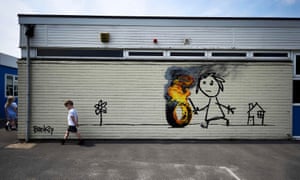
ess than six miles from Downing Street and the office Theresa May is seeking to return to, primary school children have to clean their own classrooms. This week it was reported that pupils in the London borough of Wandsworth are now vacuuming at the end of the day because their school is so underfunded that it can’t afford to replace its cleaner, a story that illustrates not only the horror of today’s austerity but is a warning sign for the future. While the NHS takes the strain and local services crumble, schools are the next public service to be gutted.
The National Audit Office calculates that by 2019-20, the education system will face cuts of 8% in real terms. That amounts to about £3bn in England – or the equivalent of £20,000 per pupil during their time in the classroom. Put that together with the new funding formula, which will see 9,000 schools face vast additional budget cuts, and secondary schools in England alone are heading for the steepest cuts to funding since the 1970s.
Last month, I asked Guardian readers to get in touch with their experiences of education cuts. The response was staggering: teachers, parents, governors, grandparents and headteachers describing a school system on its knees. “No textbooks … kids have to buy them,” wrote one teacher in High Wycombe. “School is falling to bits … radiators fitted when school was built (1950s) so in winter have recorded 8C in class.” One teacher in Newport said her class now has “no books or lined paper”; they’re asking parents to set up “voluntary direct debits” as emergency funding.
From Norfolk to London, teachers spoke of dire staff shortages – “we’re down from 60 to 15 teaching staff over the past five years,” one teacher in Weymouth told me – resulting in 40 kids in a classroom, untrained tutors brought in to teach maths, or entire subjects being “wiped out”. With no money to pay them, support staff are simply phased out – “the ones that help the children who are behind catch up”, as one parent in Leeds painfully puts it.
Strategies to stretch the budget are increasingly desperate. Reducing IT classes, for instance, because the school can’t afford to replace any broken computers. Not allowing pupils to take their technology and design projects home to parents – schools need to reuse the materials. When paper and electricity become luxuries, photocopying “caps” are the only option: one school in Bath apparently now allows only “one sheet per class per week”, and in a Peterborough school, they’re down to “one sheet of A4 per pupil”.
“At a time when year 11, 12 and 13 are desperate to attempt past papers as part of revision,” one teacher said, “we’re having to tell our poorest 16- to 18 year-olds to use their own paper-round and babysitting money to print off their own resources.”
If this is where we are now, imagine even a year – let alone five – from here. As a stark insight into the future, look at School Cuts: a website launched to enable voters to check what an individual school’s funding would be depending on the election result on 9 June. My local school – Nottingham Girls’ Academy – for example, is set to lose more than £700,000 by 2022 if the Conservatives return to power. That means 20 teachers will be gone. Labour, on the other hand, will increase the budget by more than £30,000, paying for an extra teacher.
It’s often said that for all the talk of personality and partisanship, our decision in an election ultimately comes down to our own family’s opportunities. That could surely get no more explicit than whether your children will have books at school next year.
Teachers tell me that with more cuts ahead, their plans include crowdsourcing for resources, hiring nonspecialist staff to teach A-levels and selling off playing fields. The Association of School and College Leaders has warned that some schools are considering closing early two days a week because they can’t afford enough teachers to cover the timetable; one in Birmingham has already shortened the school day by 30 minutes.
May’s team are banking on the idea that voters, dampened by years of austerity rhetoric, will accept even this level of decline of public services as somehow necessary or inevitable. But as Labour pushes schools back on to the election agenda this week, it can present a choice between May’s low expectations and the world-class education system the next generation deserves. One of the richest nations in the world is capable of adequately funding its schools. Only under a Tory government could cold classrooms and empty bookshelves be normalised.
[“source-theguardian”]




